Good Society: Political Ideology and Philosophers Essay
VerifiedAdded on 2021/11/01
|5
|1328
|33
Essay
AI Summary
This essay delves into the concept of a good society, exploring its significance and the philosophical underpinnings that shape it. It begins by defining political philosophy and its relevance to understanding governance, justice, and individual liberty. The essay then examines the contributions of key philosophers, particularly Niccolo Machiavelli and John Locke, highlighting their contrasting views on power, morality, and the nature of human freedom. Machiavelli's emphasis on practical politics and the state's interests is contrasted with Locke's defense of individual rights and freedoms. The author then articulates their own political ideology, emphasizing the importance of ethical practices, respect for diversity, and the need for informed civic engagement. The essay concludes by underscoring the importance of living in a good society, one characterized by equity, empathy, social justice, and environmental sustainability, as a means of fostering individual well-being and collective progress. The essay references works by Adil Khan and Milne, along with other scholars, to support its arguments.
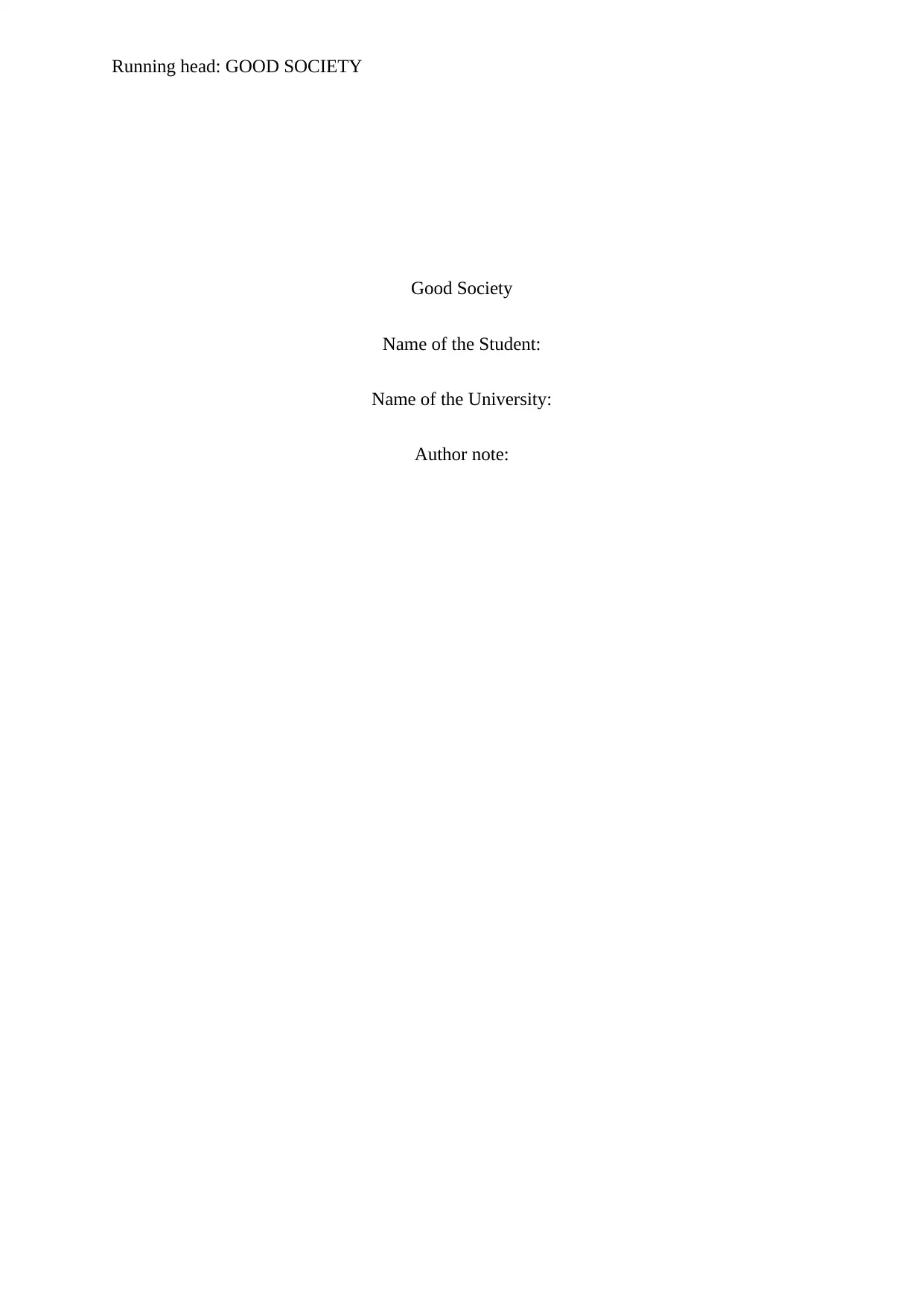
Running head: GOOD SOCIETY
Good Society
Name of the Student:
Name of the University:
Author note:
Good Society
Name of the Student:
Name of the University:
Author note:
Paraphrase This Document
Need a fresh take? Get an instant paraphrase of this document with our AI Paraphraser
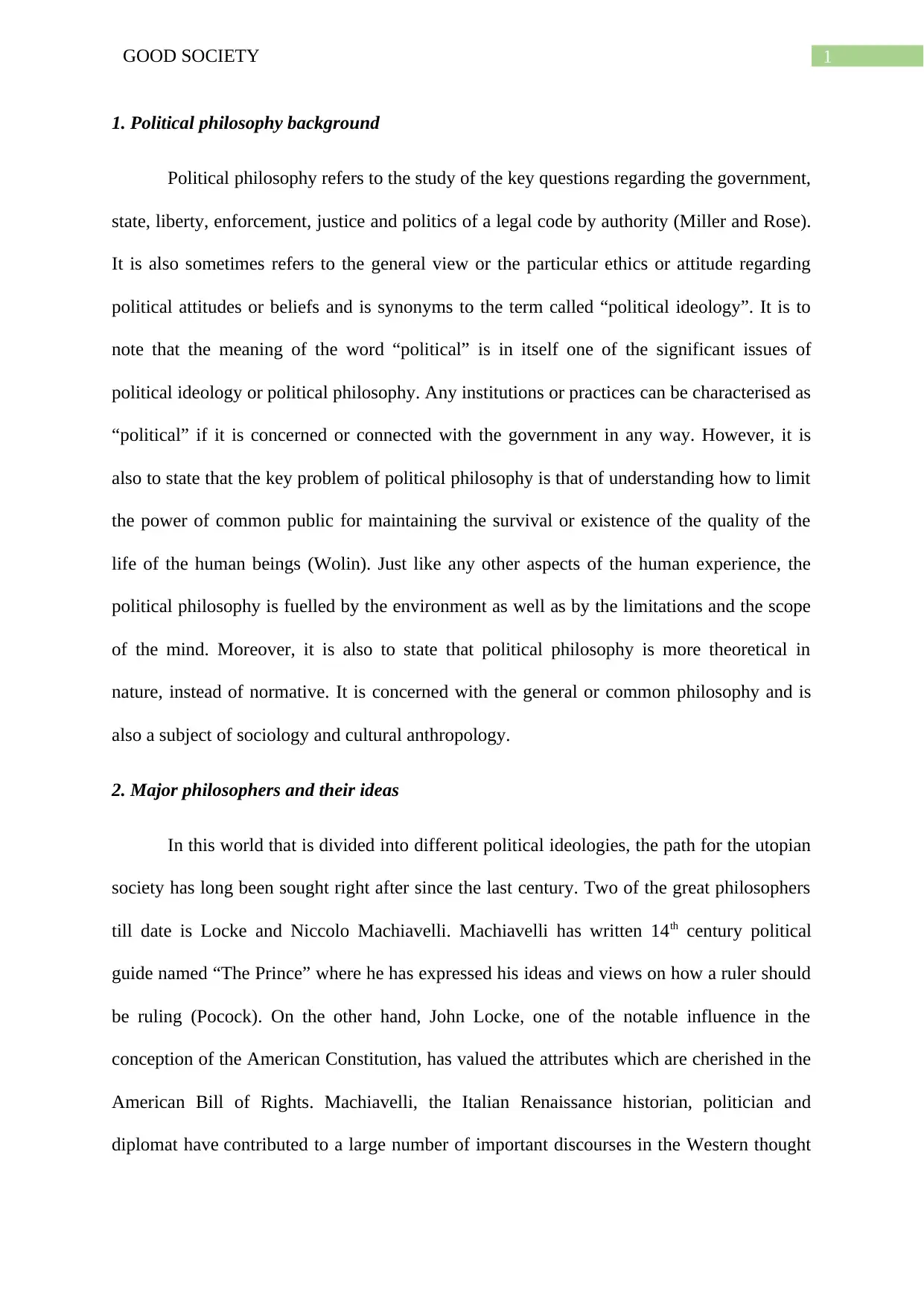
1GOOD SOCIETY
1. Political philosophy background
Political philosophy refers to the study of the key questions regarding the government,
state, liberty, enforcement, justice and politics of a legal code by authority (Miller and Rose).
It is also sometimes refers to the general view or the particular ethics or attitude regarding
political attitudes or beliefs and is synonyms to the term called “political ideology”. It is to
note that the meaning of the word “political” is in itself one of the significant issues of
political ideology or political philosophy. Any institutions or practices can be characterised as
“political” if it is concerned or connected with the government in any way. However, it is
also to state that the key problem of political philosophy is that of understanding how to limit
the power of common public for maintaining the survival or existence of the quality of the
life of the human beings (Wolin). Just like any other aspects of the human experience, the
political philosophy is fuelled by the environment as well as by the limitations and the scope
of the mind. Moreover, it is also to state that political philosophy is more theoretical in
nature, instead of normative. It is concerned with the general or common philosophy and is
also a subject of sociology and cultural anthropology.
2. Major philosophers and their ideas
In this world that is divided into different political ideologies, the path for the utopian
society has long been sought right after since the last century. Two of the great philosophers
till date is Locke and Niccolo Machiavelli. Machiavelli has written 14th century political
guide named “The Prince” where he has expressed his ideas and views on how a ruler should
be ruling (Pocock). On the other hand, John Locke, one of the notable influence in the
conception of the American Constitution, has valued the attributes which are cherished in the
American Bill of Rights. Machiavelli, the Italian Renaissance historian, politician and
diplomat have contributed to a large number of important discourses in the Western thought
1. Political philosophy background
Political philosophy refers to the study of the key questions regarding the government,
state, liberty, enforcement, justice and politics of a legal code by authority (Miller and Rose).
It is also sometimes refers to the general view or the particular ethics or attitude regarding
political attitudes or beliefs and is synonyms to the term called “political ideology”. It is to
note that the meaning of the word “political” is in itself one of the significant issues of
political ideology or political philosophy. Any institutions or practices can be characterised as
“political” if it is concerned or connected with the government in any way. However, it is
also to state that the key problem of political philosophy is that of understanding how to limit
the power of common public for maintaining the survival or existence of the quality of the
life of the human beings (Wolin). Just like any other aspects of the human experience, the
political philosophy is fuelled by the environment as well as by the limitations and the scope
of the mind. Moreover, it is also to state that political philosophy is more theoretical in
nature, instead of normative. It is concerned with the general or common philosophy and is
also a subject of sociology and cultural anthropology.
2. Major philosophers and their ideas
In this world that is divided into different political ideologies, the path for the utopian
society has long been sought right after since the last century. Two of the great philosophers
till date is Locke and Niccolo Machiavelli. Machiavelli has written 14th century political
guide named “The Prince” where he has expressed his ideas and views on how a ruler should
be ruling (Pocock). On the other hand, John Locke, one of the notable influence in the
conception of the American Constitution, has valued the attributes which are cherished in the
American Bill of Rights. Machiavelli, the Italian Renaissance historian, politician and
diplomat have contributed to a large number of important discourses in the Western thought
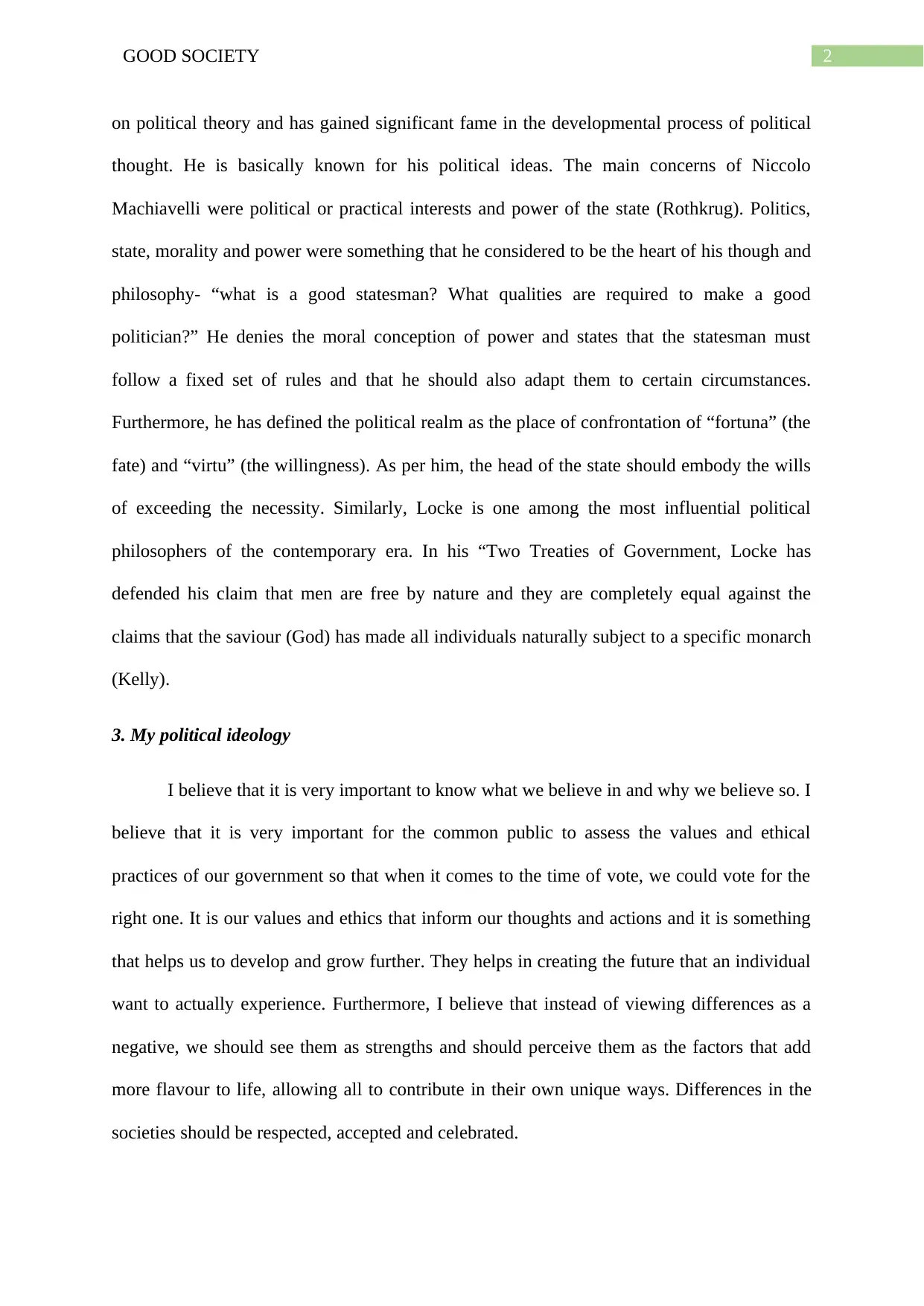
2GOOD SOCIETY
on political theory and has gained significant fame in the developmental process of political
thought. He is basically known for his political ideas. The main concerns of Niccolo
Machiavelli were political or practical interests and power of the state (Rothkrug). Politics,
state, morality and power were something that he considered to be the heart of his though and
philosophy- “what is a good statesman? What qualities are required to make a good
politician?” He denies the moral conception of power and states that the statesman must
follow a fixed set of rules and that he should also adapt them to certain circumstances.
Furthermore, he has defined the political realm as the place of confrontation of “fortuna” (the
fate) and “virtu” (the willingness). As per him, the head of the state should embody the wills
of exceeding the necessity. Similarly, Locke is one among the most influential political
philosophers of the contemporary era. In his “Two Treaties of Government, Locke has
defended his claim that men are free by nature and they are completely equal against the
claims that the saviour (God) has made all individuals naturally subject to a specific monarch
(Kelly).
3. My political ideology
I believe that it is very important to know what we believe in and why we believe so. I
believe that it is very important for the common public to assess the values and ethical
practices of our government so that when it comes to the time of vote, we could vote for the
right one. It is our values and ethics that inform our thoughts and actions and it is something
that helps us to develop and grow further. They helps in creating the future that an individual
want to actually experience. Furthermore, I believe that instead of viewing differences as a
negative, we should see them as strengths and should perceive them as the factors that add
more flavour to life, allowing all to contribute in their own unique ways. Differences in the
societies should be respected, accepted and celebrated.
on political theory and has gained significant fame in the developmental process of political
thought. He is basically known for his political ideas. The main concerns of Niccolo
Machiavelli were political or practical interests and power of the state (Rothkrug). Politics,
state, morality and power were something that he considered to be the heart of his though and
philosophy- “what is a good statesman? What qualities are required to make a good
politician?” He denies the moral conception of power and states that the statesman must
follow a fixed set of rules and that he should also adapt them to certain circumstances.
Furthermore, he has defined the political realm as the place of confrontation of “fortuna” (the
fate) and “virtu” (the willingness). As per him, the head of the state should embody the wills
of exceeding the necessity. Similarly, Locke is one among the most influential political
philosophers of the contemporary era. In his “Two Treaties of Government, Locke has
defended his claim that men are free by nature and they are completely equal against the
claims that the saviour (God) has made all individuals naturally subject to a specific monarch
(Kelly).
3. My political ideology
I believe that it is very important to know what we believe in and why we believe so. I
believe that it is very important for the common public to assess the values and ethical
practices of our government so that when it comes to the time of vote, we could vote for the
right one. It is our values and ethics that inform our thoughts and actions and it is something
that helps us to develop and grow further. They helps in creating the future that an individual
want to actually experience. Furthermore, I believe that instead of viewing differences as a
negative, we should see them as strengths and should perceive them as the factors that add
more flavour to life, allowing all to contribute in their own unique ways. Differences in the
societies should be respected, accepted and celebrated.
⊘ This is a preview!⊘
Do you want full access?
Subscribe today to unlock all pages.

Trusted by 1+ million students worldwide
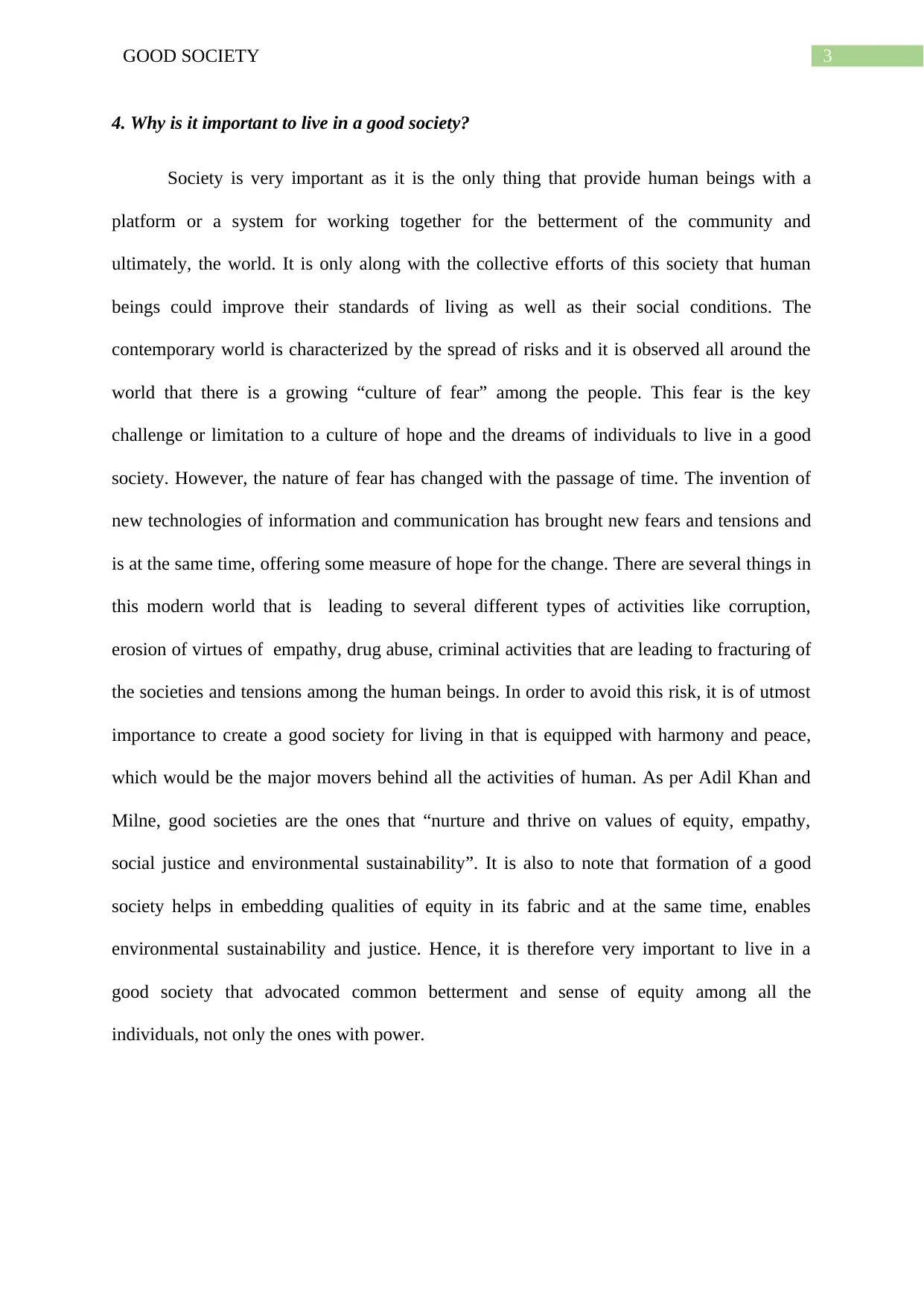
3GOOD SOCIETY
4. Why is it important to live in a good society?
Society is very important as it is the only thing that provide human beings with a
platform or a system for working together for the betterment of the community and
ultimately, the world. It is only along with the collective efforts of this society that human
beings could improve their standards of living as well as their social conditions. The
contemporary world is characterized by the spread of risks and it is observed all around the
world that there is a growing “culture of fear” among the people. This fear is the key
challenge or limitation to a culture of hope and the dreams of individuals to live in a good
society. However, the nature of fear has changed with the passage of time. The invention of
new technologies of information and communication has brought new fears and tensions and
is at the same time, offering some measure of hope for the change. There are several things in
this modern world that is leading to several different types of activities like corruption,
erosion of virtues of empathy, drug abuse, criminal activities that are leading to fracturing of
the societies and tensions among the human beings. In order to avoid this risk, it is of utmost
importance to create a good society for living in that is equipped with harmony and peace,
which would be the major movers behind all the activities of human. As per Adil Khan and
Milne, good societies are the ones that “nurture and thrive on values of equity, empathy,
social justice and environmental sustainability”. It is also to note that formation of a good
society helps in embedding qualities of equity in its fabric and at the same time, enables
environmental sustainability and justice. Hence, it is therefore very important to live in a
good society that advocated common betterment and sense of equity among all the
individuals, not only the ones with power.
4. Why is it important to live in a good society?
Society is very important as it is the only thing that provide human beings with a
platform or a system for working together for the betterment of the community and
ultimately, the world. It is only along with the collective efforts of this society that human
beings could improve their standards of living as well as their social conditions. The
contemporary world is characterized by the spread of risks and it is observed all around the
world that there is a growing “culture of fear” among the people. This fear is the key
challenge or limitation to a culture of hope and the dreams of individuals to live in a good
society. However, the nature of fear has changed with the passage of time. The invention of
new technologies of information and communication has brought new fears and tensions and
is at the same time, offering some measure of hope for the change. There are several things in
this modern world that is leading to several different types of activities like corruption,
erosion of virtues of empathy, drug abuse, criminal activities that are leading to fracturing of
the societies and tensions among the human beings. In order to avoid this risk, it is of utmost
importance to create a good society for living in that is equipped with harmony and peace,
which would be the major movers behind all the activities of human. As per Adil Khan and
Milne, good societies are the ones that “nurture and thrive on values of equity, empathy,
social justice and environmental sustainability”. It is also to note that formation of a good
society helps in embedding qualities of equity in its fabric and at the same time, enables
environmental sustainability and justice. Hence, it is therefore very important to live in a
good society that advocated common betterment and sense of equity among all the
individuals, not only the ones with power.
Paraphrase This Document
Need a fresh take? Get an instant paraphrase of this document with our AI Paraphraser
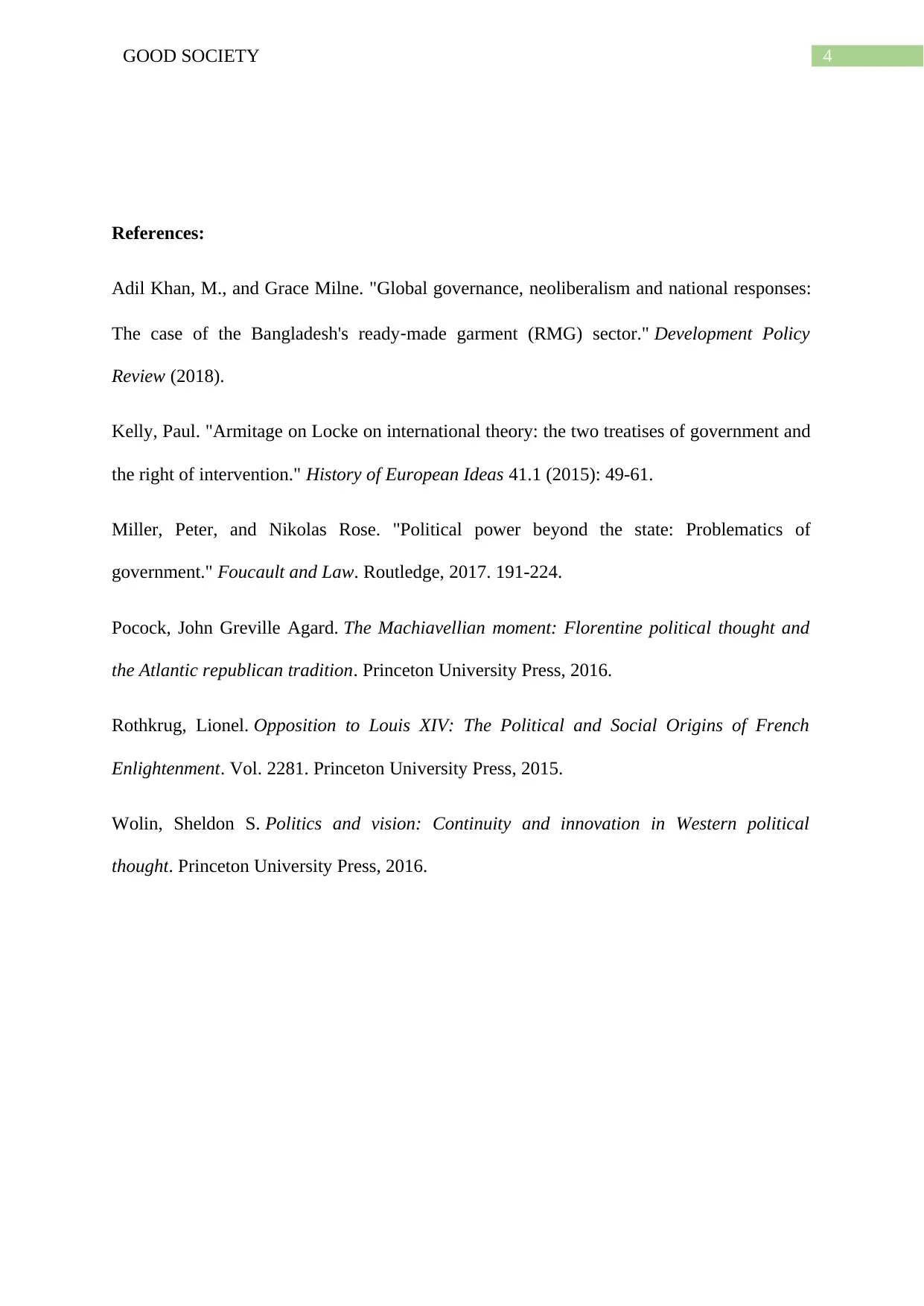
4GOOD SOCIETY
References:
Adil Khan, M., and Grace Milne. "Global governance, neoliberalism and national responses:
The case of the Bangladesh's ready‐made garment (RMG) sector." Development Policy
Review (2018).
Kelly, Paul. "Armitage on Locke on international theory: the two treatises of government and
the right of intervention." History of European Ideas 41.1 (2015): 49-61.
Miller, Peter, and Nikolas Rose. "Political power beyond the state: Problematics of
government." Foucault and Law. Routledge, 2017. 191-224.
Pocock, John Greville Agard. The Machiavellian moment: Florentine political thought and
the Atlantic republican tradition. Princeton University Press, 2016.
Rothkrug, Lionel. Opposition to Louis XIV: The Political and Social Origins of French
Enlightenment. Vol. 2281. Princeton University Press, 2015.
Wolin, Sheldon S. Politics and vision: Continuity and innovation in Western political
thought. Princeton University Press, 2016.
References:
Adil Khan, M., and Grace Milne. "Global governance, neoliberalism and national responses:
The case of the Bangladesh's ready‐made garment (RMG) sector." Development Policy
Review (2018).
Kelly, Paul. "Armitage on Locke on international theory: the two treatises of government and
the right of intervention." History of European Ideas 41.1 (2015): 49-61.
Miller, Peter, and Nikolas Rose. "Political power beyond the state: Problematics of
government." Foucault and Law. Routledge, 2017. 191-224.
Pocock, John Greville Agard. The Machiavellian moment: Florentine political thought and
the Atlantic republican tradition. Princeton University Press, 2016.
Rothkrug, Lionel. Opposition to Louis XIV: The Political and Social Origins of French
Enlightenment. Vol. 2281. Princeton University Press, 2015.
Wolin, Sheldon S. Politics and vision: Continuity and innovation in Western political
thought. Princeton University Press, 2016.
1 out of 5
Related Documents
Your All-in-One AI-Powered Toolkit for Academic Success.
+13062052269
info@desklib.com
Available 24*7 on WhatsApp / Email
![[object Object]](/_next/static/media/star-bottom.7253800d.svg)
Unlock your academic potential
Copyright © 2020–2026 A2Z Services. All Rights Reserved. Developed and managed by ZUCOL.





